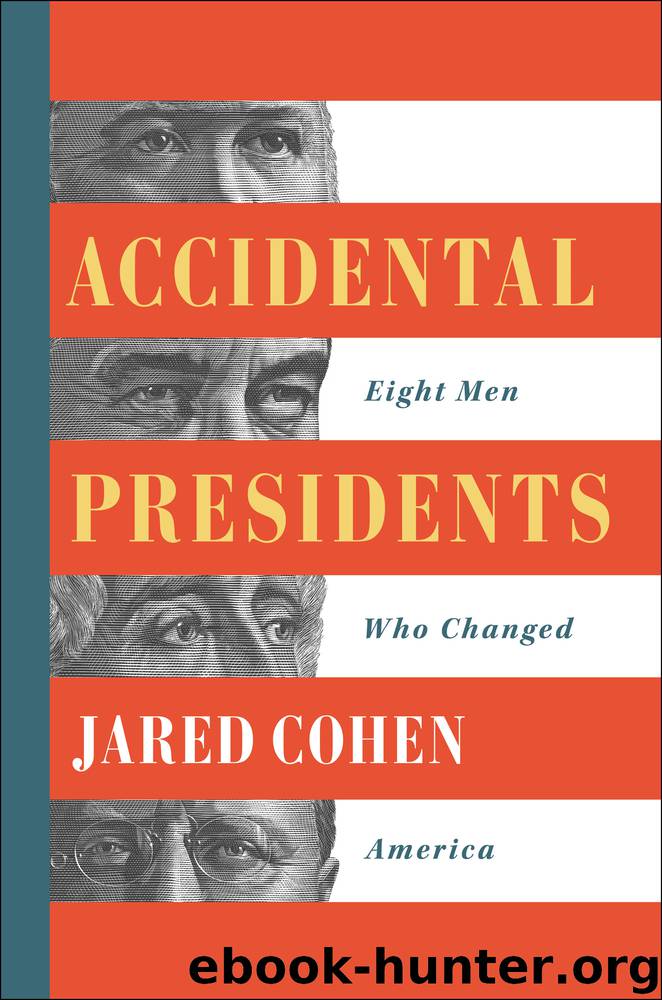Accidental Presidents : Eight Men Who Changed America (9781501109843) by Cohen Jared

Author:Cohen, Jared
Language: eng
Format: epub
Publisher: Simon & Schuster
The Dying President
Roosevelt was a sick and dying man when he ran for a fourth term in 1944. He must have had some sense of this as early as the winter of 1943 and it is difficult to imagine he didn’t grasp the realities of his health by that fall. His first two terms were grueling and the third had driven him into the ground. Following Pearl Harbor, FDR’s days grew longer, his travel more frequent, and his stress compounded. His days were consumed with navigating the war and trying to imagine the postwar order. These tasks took him further and wider than any other president in history. He had replaced John Garner for his third term with Henry Wallace, a move that caused anxiety among some of the party elite. They saw him as a far-left ideologue with a distorted worldview and feared he would hand the reins of Democratic power to the ultra-liberal labor movement.53 Influential southern Democratic leaders opposed Wallace. They shared the belief that Wallace had been imposed upon them, but their greater concern was that he was pulling Roosevelt further left on civil rights.54 Now he was about to embark on a presidential campaign! It was to be the last chapter in a long story of medical deception that had begun many years earlier with the onset of polio.
The president’s health was up and down throughout 1943. It could have easily been attributed to stress and fatigue. It wasn’t until he traveled to the Middle East in November—first to Cairo for a meeting with Winston Churchill and Chiang Kai-shek,55 and then to Tehran for a meeting with Churchill and Joseph Stalin—that it was clear that something was wrong. The Tehran Conference proved the turning point for Roosevelt’s health and many of those around him knew it.56
Roosevelt had been courting a meeting with Stalin since the U.S. entered the war in 1941. After some back-and-forth with Churchill about two of Stalin’s most pressing issues—securing a British commitment to help drive the Nazis out of France and delivering wartime materials through the Arctic to the Soviet Union57—Roosevelt wrote Stalin on April 11, 1942, to request a bilateral meeting, but the response was evasive.58 He tried again on December 2, 1942, this time suggesting that Churchill join and the three “meet secretly in some secure place in Africa.”59 Again, Stalin’s response was lukewarm and on December 8, Roosevelt wrote, “I am deeply disappointed you feel you cannot get away for a conference in January [1943] . . . I want to suggest that we set a tentative date for meeting in North Africa about March first.”60 His eagerness may have led Stalin to prolong the courtship. Roosevelt continued trying and eventually Stalin agreed to meet. But he would travel no further than Iran.61
As the presidential party made its way to Iran, his underqualified and overly empowered physician, Ross McIntire, pleaded with the president to make part of the trip by train. When Roosevelt refused, he emphasized that the flight should stay at sub–wartime protocol elevation.
Download
This site does not store any files on its server. We only index and link to content provided by other sites. Please contact the content providers to delete copyright contents if any and email us, we'll remove relevant links or contents immediately.
The Secret History by Donna Tartt(19028)
The Social Justice Warrior Handbook by Lisa De Pasquale(12182)
Thirteen Reasons Why by Jay Asher(8883)
This Is How You Lose Her by Junot Diaz(6872)
Weapons of Math Destruction by Cathy O'Neil(6261)
Zero to One by Peter Thiel(5782)
Beartown by Fredrik Backman(5734)
The Myth of the Strong Leader by Archie Brown(5491)
The Fire Next Time by James Baldwin(5423)
How Democracies Die by Steven Levitsky & Daniel Ziblatt(5211)
Promise Me, Dad by Joe Biden(5139)
Stone's Rules by Roger Stone(5078)
A Higher Loyalty: Truth, Lies, and Leadership by James Comey(4946)
100 Deadly Skills by Clint Emerson(4911)
Rise and Kill First by Ronen Bergman(4775)
Secrecy World by Jake Bernstein(4738)
The David Icke Guide to the Global Conspiracy (and how to end it) by David Icke(4696)
The Farm by Tom Rob Smith(4500)
The Doomsday Machine by Daniel Ellsberg(4481)
